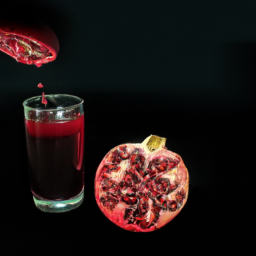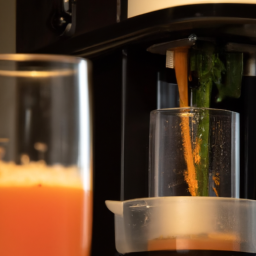Juice Tips and Tricks
How Long Is Fresh Squeezed Grapefruit Juice Good For

As a fan of grapefruit juice, there’s something special about beginning the day with a refreshing glass of cold, freshly squeezed grapefruit juice. Its tangy and slightly tart taste is just the thing to awaken the senses and kickstart the day. However, like most freshly made juices, determining how long grapefruit juice stays fresh can be a bit tricky.
So, just how long is fresh squeezed grapefruit juice good for? Picture this, you’ve just spent a good amount of time squeezing a bunch of grapefruits to make your favorite juice. You take a sip and it’s absolutely delicious, but as the day goes on, you start to wonder if it’s still safe to drink.
This is where understanding the factors that affect the shelf life of fresh squeezed grapefruit juice comes in handy. From storage methods to signs of spoilage, in this article, we’ll cover everything you need to know to ensure your grapefruit juice stays fresh and safe to consume.
Key Takeaways
- Fresh squeezed grapefruit juice should be stored at 40°F or below in an airtight container to prevent oxidation and loss of flavor/nutrients.
- Adding lemon juice or ascorbic acid can preserve color and flavor for 5-7 days.
- Signs of spoilage include a sour/off taste, cloudy appearance, and foul odor. Spoiled juice can cause food poisoning.
- Canned juice can be stored for up to a year, while frozen juice should be consumed within a few months. Thawing should be done in the refrigerator for best flavor/nutrient retention.
Factors Affecting the Shelf Life of Fresh Squeezed Grapefruit Juice
If you want to extend the lifespan of your freshly squeezed grapefruit juice, you’ll need to consider a few key factors. The first is the temperature at which the juice is stored. Fresh squeezed grapefruit juice should be kept in the refrigerator at a temperature of 40 degrees Fahrenheit or below. If the juice is stored at a higher temperature, it will spoil more quickly.
Another factor that affects the taste and health benefits of fresh squeezed grapefruit juice is exposure to air. Once the juice is squeezed, it begins to oxidize and lose its flavor and nutritional value. To slow down this process, it’s important to store the juice in an airtight container. This will help to preserve the juice’s freshness and prevent it from going bad too quickly.
With these factors in mind, you can enjoy your fresh squeezed grapefruit juice for longer and reap all of its health benefits. So, how long can fresh squeezed grapefruit juice last in the fridge?
How Long Can Fresh Squeezed Grapefruit Juice Last in the Fridge?
You’ve just made a deliciously tangy elixir that’s ready to chill in the fridge until its sweet nectar is ready to be savored. But how long can you expect your fresh squeezed grapefruit juice to last? Proper storage is key to preserving freshness.
The best way to keep your juice fresh is to store it in an airtight container in the refrigerator. This will prevent the juice from being exposed to air, which can cause it to oxidize and lose its flavor. To further extend the shelf life of your fresh squeezed grapefruit juice, you can also consider adding a small amount of lemon juice or ascorbic acid to the mix. These ingredients can help to preserve the color and flavor of your juice for up to 5-7 days.
Additionally, it’s worth noting that fresh squeezed grapefruit juice is packed with vitamins and antioxidants that can help to boost your immune system and support overall health. Try incorporating a glass of fresh squeezed grapefruit juice into your daily routine for a refreshing and nutritious way to start your day.
As much as we would love for our fresh squeezed grapefruit juice to last forever, it’s important to know the signs that it has gone bad. In the next section, we’ll discuss how to tell if your juice has spoiled and what to do with it.
Signs that Fresh Squeezed Grapefruit Juice Has Gone Bad
Pay attention to these warning signs! When your grapefruit juice starts to smell funky or develop mold, it’s time to toss it out.
These are common contaminants that can grow in fresh squeezed juice when not properly stored. While some may think it’s okay to drink juice that’s past its prime, it’s important to understand the potential health risks.
Drinking bad grapefruit juice can lead to food poisoning, which can cause symptoms such as vomiting, diarrhea, and stomach cramps. In severe cases, it can even lead to dehydration and hospitalization.
To avoid these potential health risks, it’s best to only consume fresh squeezed grapefruit juice that has been stored properly. With that said, let’s move on to some tips for storing fresh squeezed grapefruit juice.
Tips for Storing Fresh Squeezed Grapefruit Juice
Ironically, even though grapefruit juice is known for its sour taste, storing it in a sweet spot can help prolong its shelf life. When it comes to storing fresh squeezed grapefruit juice, there are a few tips to keep in mind to ensure that it stays fresh for as long as possible. One of the most important factors is the container in which the juice is stored. It’s crucial to use an airtight container to prevent the juice from being exposed to air, which can cause it to spoil more quickly. Glass containers are the best option, as they don’t contain any chemicals that can leach into the juice and alter its taste.
Another important factor to consider is the refrigeration options. Fresh squeezed grapefruit juice should always be stored in the refrigerator to keep it fresh for as long as possible. The ideal temperature for storing grapefruit juice is between 32 and 40°F (0 and 4°C). This temperature range helps to slow down the growth of bacteria and other microorganisms that can cause the juice to spoil. Additionally, it’s important to keep the juice away from any other foods that emit strong odors, as the juice can easily absorb these smells and alter its flavor. By following these tips, you can ensure that your fresh squeezed grapefruit juice stays fresh and delicious for a longer period of time.
As important as it is to store fresh squeezed grapefruit juice properly, it’s also crucial to know when it’s time to toss it out. In the next section, we’ll explore some ways to tell if your grapefruit juice has spoiled and should no longer be consumed.
How to Tell If Your Grapefruit Juice Has Spoiled
It’s crucial to be able to recognize when your grapefruit juice has gone bad, as drinking spoiled juice can lead to health risks and a waste of money. Common contaminants in grapefruit juice include bacteria, mold, and yeast, which can cause the juice to ferment and spoil.
Signs that your juice has gone bad include a sour or off taste, a cloudy appearance, and a foul odor. Drinking spoiled grapefruit juice can not only upset your stomach, but it can also lead to more serious health risks such as food poisoning. If you suspect your juice has gone bad, it’s best to discard it rather than risk drinking it.
In the next section, we’ll discuss whether or not fresh squeezed grapefruit juice can be frozen for later use.
Can You Freeze Fresh Squeezed Grapefruit Juice?
Freezing fresh squeezed grapefruit juice is a convenient way to preserve its tangy flavor and nutritional benefits for later use. Not only does it allow you to enjoy the taste of freshly squeezed grapefruit juice all year-round, but it also saves time and effort in making the juice every time you want to drink it. However, before you start freezing your grapefruit juice, there are a few things you need to keep in mind.
First, it is important to note that freezing grapefruit juice can alter its texture and taste. To minimize this effect, it is recommended to use airtight containers and leave some space at the top to allow for expansion. Additionally, it is best to consume the frozen juice within a few months to ensure it maintains its quality. But don’t let this discourage you from freezing your grapefruit juice! There are plenty of creative grapefruit recipes that you can make with frozen juice, such as grapefruit margaritas or grapefruit sorbet. Plus, the benefits of drinking fresh grapefruit juice, such as reducing inflammation and promoting healthy digestion, make it worth the effort of preserving it for later use.
As convenient as freezing fresh squeezed grapefruit juice may be, it is important to know how long you can store it to ensure its quality. In the next section, we will discuss how long frozen grapefruit juice can last and the best ways to thaw it.
How Long Can You Store Frozen Grapefruit Juice?
Storing frozen grapefruit juice is a great way to have a tangy and nutritious drink at your fingertips whenever you need it. But how long can you store it? Here are some things to keep in mind:
-
Freezing methods: When freezing grapefruit juice, it’s important to use a method that won’t damage the flavor and texture of the juice. One popular method is to pour the juice into ice cube trays, then transfer the frozen cubes to a plastic bag. Another option is to use a vacuum sealer to remove all the air from a plastic bag before freezing.
-
Best containers: Regardless of the freezing method you choose, it’s important to use a container that is airtight and won’t allow any moisture to enter. Glass containers are not recommended, as they can crack and break when frozen. Plastic containers with tight-fitting lids are a good choice, as are plastic bags designed for freezing food.
With these tips in mind, you can store frozen grapefruit juice for up to six months without sacrificing quality. However, when you’re ready to enjoy your juice, it’s important to thaw it properly to maintain its flavor and nutritional value.
How to Thaw Frozen Grapefruit Juice
To enjoy your frozen grapefruit juice, you’ll need to thaw it properly, so it’s ready to drink when you want it. Thawing techniques vary depending on how much time you have and what equipment you have available. Here are some popular thawing methods to consider:
| Thawing Method | Time Required | Flavor Preservation |
|---|---|---|
| Refrigerator | 24 hours | Best |
| Room Temperature | 2-3 hours | Good |
| Microwave | 30 seconds to 1 minute | Okay |
| Cold Water Bath | 30 minutes to 1 hour | Okay |
| Hot Water Bath | 5-10 minutes | Worst |
To preserve the flavor of your grapefruit juice, it’s best to thaw it slowly in the refrigerator. This method will take the longest, but it will also retain the most flavor and nutrients. If you’re short on time, you can try thawing at room temperature or using a microwave, but be aware that these methods may affect the taste. Avoid using hot water to thaw your juice as this can damage the nutrients and create a bitter taste. Once your juice is thawed, give it a good stir before drinking to make sure it’s fully mixed and ready to enjoy.
Other ways to preserve fresh squeezed grapefruit juice include freezing it in ice cube trays or canning it.
Other Ways to Preserve Fresh Squeezed Grapefruit Juice
Preserving the zesty flavor of grapefruit juice can be achieved through alternative methods such as canning or freezing in ice cube trays.
Canning fresh squeezed grapefruit juice involves heating the juice to a high temperature, pouring it into sterilized jars, and sealing them tightly. The jars can then be stored in a cool, dark place for up to a year. This method not only preserves the flavor of the juice but also makes it convenient to use throughout the year.
Another way to make fresh squeezed grapefruit juice last longer is to freeze it in ice cube trays. Simply pour the juice into the trays and freeze until solid. The juice cubes can then be stored in a freezer-safe container for up to six months. These cubes can be used in a variety of recipes, such as marinades, cocktails, and smoothies.
By preserving grapefruit juice in these alternative ways, the zesty flavor can be enjoyed throughout the year.
Frequently Asked Questions
Can I mix fresh squeezed grapefruit juice with other juices?
As the saying goes, "variety is the spice of life."Mixing combinations of fresh squeezed grapefruit juice with other juices can add nutritional benefits to your diet. Experiment with different flavors and ratios to find your perfect blend.
Does adding sugar or preservatives affect the shelf life of fresh squeezed grapefruit juice?
Adding sugar or preservatives to fresh squeezed grapefruit juice can affect its shelf life by changing its pH level and providing a food source for bacteria. Refrigeration is important to slow down bacterial growth. Effects of processing can also impact shelf life.
Can I store fresh squeezed grapefruit juice in a plastic container?
I recommend using glass containers instead of plastic for storing fresh squeezed grapefruit juice, as plastic can leach chemicals into the juice. Best storage practices include keeping the juice refrigerated and consuming it within 2-3 days.
Can I reuse a container that previously held grapefruit juice for storing more fresh squeezed juice?
While it is possible to reuse a container that previously held grapefruit juice, container hygiene is important to prevent contamination. Alternative storage options include glass bottles or jars.
Can I still drink grapefruit juice if it has changed color or has a slightly different taste?
If grapefruit juice changes color or has a different taste, it may indicate spoilage. Refrigeration can extend shelf life, but it’s best to discard if there are noticeable changes in color or taste.
Conclusion
So, if you’re wondering how long fresh squeezed grapefruit juice is good for, the answer is that it depends on a number of factors. Generally speaking, fresh squeezed grapefruit juice can last up to five to seven days when stored properly in the fridge.
However, it’s important to keep in mind that factors like temperature, exposure to light, and the level of acidity in your juice can all affect its shelf life. While some may argue that it’s not worth the effort to squeeze your own grapefruit juice, the truth is that the flavor and nutritional value of fresh squeezed juice can’t be beat.
With a little bit of care and attention, you can enjoy delicious, healthy grapefruit juice for days or even weeks. So, if you’re willing to put in the time and effort, go ahead and give it a try! Don’t forget that grapefruit juice isn’t the only refreshing option you can explore. If you’re ever struggling with digestion, many people also turn to pear juice for constipation relief, thanks to its high fiber content and natural laxative properties. By incorporating a variety of juices into your routine, you can support both hydration and overall well-being.
Cindy thoroughly researches juicing trends, techniques, and recipes to provide readers with practical advice and inspiration. Her writing style is accessible, engaging, and designed to make complex concepts easy to understand. Cindy’s dedication to promoting the advantages of juicing shines through her work, empowering readers to make positive changes in their lives through the simple act of juicing.
Juice Tips and Tricks
How Much Is The Juice Of One Lemon

Did you know that one lemon can yield about 2-4 tablespoons of juice? While it may seem small, in the realms of cooking and mixing beverages, this quantity can have a significant impact. Juice from a single lemon can liven up a salad dressing, inject a zesty flavor into marinades, or harmonize the sweetness in desserts. Its lively acidity also complements the flavors of cocktails and mocktails, making it a crucial component in numerous recipes. Do not underestimate the influence of fresh lemon juice in enhancing your dishes and beverages!
Lemon juice is a versatile ingredient that can be used to add brightness and acidity to a variety of dishes, from salad dressings to marinades to cocktails.
But how much juice can you really expect from one lemon? That’s a question that many home cooks and bartenders often ask themselves. The answer depends on a variety of factors, including the ripeness and size of the lemon, as well as the juicing technique used.
In this article, I’ll explore the science behind lemon juice, share tips for getting the most juice out of your lemons, and provide guidance on measuring and storing lemon juice for use in your favorite recipes.
Key Takeaways
- The amount of juice in one lemon can vary depending on factors such as ripeness, size, and juicing technique.
- On average, one lemon yields 2-3 tablespoons of juice.
- Meyer lemons yield more juice than Eureka lemons.
- Using a lemon squeezer or citrus reamer can help get the most juice out of a lemon.
Understanding the Importance of Lemon Juice in Cooking and Mixology
You’re gonna love using lemon juice in your cooking and mixology – it adds a refreshing zing that can’t be beat!
In fact, lemon juice is a staple in many classic cocktails, including the margarita and the daiquiri. It can also be used to brighten up savory dishes like fish, chicken, and vegetables. But did you know that lemon juice also has a range of health benefits? It’s packed with vitamin C, which is great for boosting your immune system, and can even help with digestion.
When it comes to mixing cocktails, lemon juice is a must-have ingredient. Not only does it add a tart and tangy flavor, but it also helps to balance out the sweetness of other ingredients like simple syrup or fruit juices. And because it’s so versatile, you can use it to make a wide variety of cocktails – from classic sours to modern twists on old favorites. So, the next time you’re mixing up a drink, don’t forget to add a splash of lemon juice!
Now, let’s talk about the factors that can affect the amount of juice you’ll get from one lemon.
Factors Affecting the Amount of Juice in One Lemon
When looking to maximize the amount of citrus flavor in your recipe, it’s important to consider the factors that impact the yield of a single lemon’s juice. Factors such as the variety of lemon, its ripeness, and the method used for juicing can all affect the amount of juice that can be extracted from a single lemon.
Firstly, the variety of lemon used can significantly impact the juice yield. Meyer lemons, for example, are known to contain more juice than Eureka lemons. Additionally, the ripeness of the lemon can also play a role. Ripe lemons tend to have a softer flesh that can be easier to juice, while unripe lemons may require more effort to extract the juice.
When it comes to juicing, using a handheld juicer or rolling the lemon on a hard surface before cutting it can help to release more juice. Considering these factors can help to ensure that your recipe achieves the desired flavor profile.
When it comes to choosing the right lemons for juicing, there are a few steps to consider.
How to Choose the Right Lemons for Juicing
To ensure the best flavor in your recipe, it’s important to choose lemons that are ripe and plump, as well as have a thin and smooth skin.
When choosing ripe lemons, look for ones that are heavy for their size and have a bright yellow color. Avoid overripe lemons that have a wrinkled or dull appearance, as these may have less juice and a weaker flavor.
In addition to appearance, the texture of the skin can also indicate the juiciness of the lemon. A thin and smooth skin is typically easier to juice than a thick and bumpy skin.
When squeezing the lemon, you want to apply gentle pressure to release the juice without perforating the skin. With the right lemons and techniques, you can extract maximum juice for your recipes.
Techniques for Extracting Maximum Juice from Lemons
By using a lemon squeezer, you’re getting every drop of sunshine from a lemon, ensuring you get the most out of your citrus fruit. Using kitchen tools like a lemon squeezer or a citrus reamer is the best way to extract maximum juice from lemons.
Here are some best practices for juicing lemons and minimizing waste:
- Roll the lemon on the counter with some pressure before cutting it in half to break down the membranes and release the juice.
- Use a spoon to scrape out any remaining flesh and juice from the inside of the lemon after juicing.
- Use a fine-mesh strainer to strain the juice to remove any pulp or seeds.
These techniques will not only help you extract more juice from your lemons but also reduce waste.
Now that we’ve learned how to extract maximum juice from lemons, let’s move on to measuring lemon juice for recipes.
Measuring Lemon Juice for Recipes
Measuring the tangy nectar of a freshly squeezed lemon is essential to get the perfect balance of flavors in your recipes. When it comes to measuring lemon juice, accuracy is key. Depending on the recipe, even a small difference in the amount of lemon juice used can greatly affect the final taste. To ensure accuracy, use a measuring cup or spoon when squeezing the lemon.
To help you understand the amount of juice you can expect from a lemon, here is a table comparing the juice yield of different citrus fruits:
| Citrus Fruit | Amount of Juice |
|---|---|
| Lemon | 2-3 tablespoons |
| Lime | 2 tablespoons |
| Orange | 1/4 – 1/3 cup |
Although lemon is the most commonly used citrus fruit in cooking, it’s good to know that there are alternative options available. Lime is a great substitute for lemon juice, especially in Mexican cuisine, while orange juice can add a sweet and tangy flavor to your recipes. Now that we know the importance of measuring accuracy and the options available, let’s dive into how much juice to expect from one lemon.
How Much Juice to Expect from One Lemon
I’ve always wondered how much juice I can expect to get from one lemon when I’m making a recipe that calls for it. After doing some research, I learned that the average yield for one lemon is about 2-3 tablespoons of juice.
However, this amount can vary based on factors such as the size, ripeness, and juiciness of the lemon.
Average Yield
On average, squeezing the juice out of one lemon yields about 2-3 tablespoons. This may not seem like a lot, but when combined with other ingredients, it can add a burst of flavor to any dish. Not only does lemon juice add a tangy taste, but it also provides nutritional benefits such as vitamin C and antioxidants.
To give you a better idea of just how beneficial lemon juice can be, here are some fascinating facts about its nutritional content:
- One lemon contains 31% of the recommended daily intake of vitamin C.
- The antioxidants in lemon juice can help protect against free radicals that can damage cells.
- Lemon juice can aid digestion by stimulating the production of stomach acid.
- Drinking lemon water can help hydrate the body and promote healthy skin.
While the average yield of lemon juice is 2-3 tablespoons, there are several factors that can affect this amount. From the ripeness of the lemon to the juicing technique used, each element can play a role in the final yield.
Variations Based on Factors
Now that we know the average yield of lemon juice, let’s dive into the variations of this yield based on several factors. One of the most significant factors that affect the amount of juice in a lemon is its acidity level. The higher the acidity level of the lemon, the more juice it is likely to yield. Therefore, it’s better to choose lemons that are ripe and have a slightly softer texture, as they tend to be more acidic and produce more juice. Additionally, rolling the lemon on a hard surface before juicing it can help to break down the cells and release more juice.
However, there may be times when you don’t have access to fresh lemons or want to try a different flavor. In such cases, you can substitute lemon juice with other citrus juices such as lime, grapefruit, or orange. These juices have a similar acidity level and can provide a similar flavor profile to lemon juice. However, keep in mind that the taste may not be exactly the same, and it’s always better to use fresh lemons whenever possible.
When it comes to storing and preserving lemon juice, there are a few tips and tricks that can help to extend its shelf life.
Tips for Storing and Preserving Lemon Juice
When it comes to storing and preserving lemon juice, there are several methods that I’ve found to be effective.
One option is refrigeration, which can keep the juice fresh for up to a week.
Freezing is another option, allowing you to store the juice for several months.
Bottling and canning are also popular methods for long-term preservation.
Refrigeration
You’ll want to keep your freshly squeezed lemon juice in the fridge to maximize its flavor and shelf life. Lemon juice is highly perishable and can go bad quickly if left at room temperature.
Refrigeration can help extend its shelf life for up to 2-3 weeks. Aside from its culinary uses, lemon juice can also be used for various purposes such as cleaning, skin care, and even as a natural remedy for sore throat.
Refrigerating your lemon juice will ensure that it remains fresh and potent for all these uses. Now, if you want to further extend its shelf life, the next step would be to freeze it.
Freezing
To freeze your fresh lemon juice, simply pour it into an ice cube tray and pop it in the freezer.
Freezing is a great way to extend the shelf life of lemon juice, as it can last for up to six months in the freezer. Just make sure to label your ice cube tray with the date you froze the juice, so you can keep track of when it was made.
When it comes time to use your frozen lemon juice, simply pop out a cube or two and let it thaw in the fridge for a few hours. You can also thaw it at room temperature, or in the microwave if you’re in a hurry.
Once thawed, the lemon juice will have the same flavor and acidity as fresh juice, making it a convenient and cost-effective way to have lemon juice on hand whenever you need it.
With that said, let’s move on to the next step: bottling and canning.
Bottling and Canning
If you’re looking for a way to preserve your fresh lemon juice for future use, bottling and canning is a great option.
Bottling techniques involve pouring the juice into sterilized jars, leaving some headspace at the top, and sealing them tightly. Canning, on the other hand, involves heating the juice in a water bath or pressure canner, which kills any bacteria and creates a vacuum seal that extends the juice’s shelf life.
When properly bottled or canned, lemon juice can last for up to a year. However, it’s important to note that the juice’s shelf life depends on several factors such as the acidity level, sugar content, and temperature at which it’s stored.
To ensure the longest shelf life possible, it’s recommended to store bottled or canned lemon juice in a cool, dry place away from sunlight.
If you’re not up for bottling and canning, there are other ways to obtain citrus juice. Let’s explore some alternative sources in the next section.
Alternative Sources of Citrus Juice
There’s a multitude of ways to add a citrusy kick to your dish without solely relying on the juice of one lemon. Here are some alternative sources of citrus juice that can be just as tasty and beneficial:
-
Lime juice: Similar to lemon juice, lime juice is a great substitute in recipes calling for citrus juice. It has a slightly different flavor, but still adds acidity and brightness to dishes.
-
Orange juice: While not as tart as lemon or lime juice, orange juice can still add a nice citrus flavor to dishes. It’s especially delicious in marinades and dressings.
-
Grapefruit juice: Grapefruit juice is tart and slightly bitter, making it a good option for balancing out sweet dishes. It’s also a great source of vitamin C.
-
Lemon water: If you’re looking for the health benefits of lemon juice without the tartness, try drinking lemon water. It’s a great way to stay hydrated and can aid in digestion and skin health.
With these alternative sources of citrus juice, you can add a citrusy kick to your dishes without relying solely on the juice of one lemon. But if you do want to use lemon juice, here are some delicious recipes featuring lemon juice that you can try.
Recipes Featuring Lemon Juice
Get ready to add a zesty burst of flavor to your meals with these delicious recipes featuring the tangy goodness of fresh lemon juice.
Not only does lemon juice add a bright and refreshing taste to dishes, but it also has many health benefits. Lemon juice is high in vitamin C, which supports the immune system and aids in the absorption of iron. It also contains antioxidants that can help protect against cell damage and reduce inflammation.
If you don’t have fresh lemon juice on hand, there are several substitutes you can use. Lime juice has a similar flavor profile and can be used interchangeably in most recipes. White wine vinegar and apple cider vinegar can also be used as substitutes, but keep in mind that they may alter the taste slightly.
Now, onto the recipes! Lemon juice is a versatile ingredient that can be used in everything from marinades and dressings to desserts and cocktails. Try using it in a simple vinaigrette for a bright and tangy salad dressing, or add it to a marinade for grilled chicken or fish. For a sweet treat, try making lemon bars or lemon meringue pie. The possibilities are endless with this versatile ingredient.
Frequently Asked Questions
Can lemon juice be substituted with other citrus juices in recipes?
Yes, lemon juice can be substituted with other citrus juices in recipes. However, the amount and acidity level may need to be adjusted. Grapefruit, lime, and orange juices are popular substitutes.
How long can fresh lemon juice be stored in the refrigerator?
To properly store fresh lemon juice in the refrigerator, transfer it to an airtight container and keep it for up to one week. Use leftover lemon juice before it goes bad by adding it to drinks, dressings, or marinades.
Does the ripeness of a lemon affect the amount of juice it contains?
As the saying goes, "you can’t make lemonade without lemons."The ripeness of a lemon can affect its juice yield. Using proper juice extraction techniques can maximize juice extraction regardless of ripeness.
Can lemon juice be frozen for later use?
Yes, lemon juice can be frozen for later use. It’s best to freeze it in an ice cube tray and then transfer the frozen cubes to a freezer bag. Lemon juice concentrate is also an option for longer storage.
Is it necessary to use a specific type of juicer for extracting lemon juice?
I’ve found that there are various juicer types that can be used for extracting lemon juice, such as manual or electric ones. The extraction method also varies, but it’s important to choose one that minimizes pulp and maximizes juice yield.
Conclusion
Well folks, that’s all there is to know about the juice of one lemon! As a food enthusiast and mixology aficionado, I can’t stress enough the importance of having fresh lemon juice on hand.
From adding a zesty flavor to your favorite dishes to creating the perfect cocktail, lemon juice is a must-have ingredient.
But before you start juicing away, remember to choose the right lemons and use proper techniques to get the most juice out of each fruit. And don’t forget to measure the juice for your recipes!
With these tips and tricks, you’ll be a lemon juice pro in no time. So go ahead, add a little zest to your life and enjoy the sweet (or sour) taste of this versatile citrus fruit. Cheers!
Cindy thoroughly researches juicing trends, techniques, and recipes to provide readers with practical advice and inspiration. Her writing style is accessible, engaging, and designed to make complex concepts easy to understand. Cindy’s dedication to promoting the advantages of juicing shines through her work, empowering readers to make positive changes in their lives through the simple act of juicing.
Juice Tips and Tricks
How Much Is Pomegranate Juice

As an individual who prioritizes health and constantly looks for ways to enhance my diet, I have been learning about the various advantages of consuming pomegranate juice. However, upon delving deeper into the topic, I discovered that I lacked knowledge on the expense associated with this popular beverage. Therefore, I took it upon myself to conduct some research to uncover the cost of pomegranate juice and understand the factors that influence its pricing.
In this article, I’ll be sharing what I learned about the cost of pomegranate juice, including factors that affect pricing, comparisons of different brands, and tips for finding deals. I’ll also dive into the differences between organic and non-organic options, as well as cold-pressed vs. regular juice.
Whether you’re a fan of pomegranate juice already or just curious about trying it out, this guide will help you make an informed decision about the value of this popular drink.
Key Takeaways
- The cost of pomegranate juice is affected by factors such as brand, packaging, concentration, and location.
- Popular brands of pomegranate juice include POM Wonderful, Tropicana, Ocean Spray, Lakewood, and Trader Joe’s, with Lakewood being the most expensive and Trader Joe’s offering the best deal.
- Organic options may be more expensive but are free from harmful pesticides and chemicals and may contain higher nutrient levels.
- Local availability and importing costs can greatly impact the price of pomegranate juice, and it’s important to compare prices before making a purchase.
Understanding the Health Benefits of Pomegranate Juice
You’re going to love the health benefits you get from drinking pomegranate juice! Not only does it taste delicious, but it also has numerous benefits for your body.
One of the most significant benefits of pomegranate juice is its ability to promote heart health. Studies have shown that regular consumption of pomegranate juice can lower blood pressure, reduce inflammation, and improve cholesterol levels.
In addition to promoting heart health, pomegranate juice can also boost your immune system. It contains antioxidants that help fight off harmful free radicals in your body. These free radicals can damage your cells and increase the risk of developing chronic diseases. By drinking pomegranate juice regularly, you can give your immune system a much-needed boost and protect your body from these harmful effects.
Now, let’s talk about factors that affect the cost of pomegranate juice.
Factors that Affect the Cost of Pomegranate Juice
When I’m shopping for pomegranate juice, I’ve noticed that the prices can vary quite a bit. After doing some research, I’ve learned that there are several factors that can affect the cost of pomegranate juice.
These factors include the brand, packaging, concentration, and location of where the juice is produced.
Brand
The price of pomegranate juice can vary depending on the brand, with some of the top-selling brands costing around $4 per 16-ounce bottle. When it comes to buying pomegranate juice, brand name is an important factor to consider. Here are some things to keep in mind: Certain brands may use higher-quality pomegranates or have more concentrated juice, which could justify the higher cost. It’s essential to balance quality with affordability, especially when comparing it to alternatives like the orange juice price at McDonald’s, which may offer a more budget-friendly option for those seeking a different fruit juice. Ultimately, it’s about finding the right product that fits both your taste preferences and budget.
- Some brands use organic pomegranates, which can increase the price.
- Certain brands may only be available in certain regions, affecting their price and availability distribution.
- Some brands may offer larger or smaller bottle sizes, affecting the price per ounce.
- Premium brands may charge a higher price due to their reputation and marketing strategies.
- Store brand or generic options may offer a lower price point for consumers on a budget.
Considering these factors, it’s important to do your research and compare prices before making a purchase.
Next, we’ll explore another important factor in the cost of pomegranate juice: packaging.
Packaging
If you want to experience the luxurious sensation of drinking from a glass bottle, opt for brands that offer this type of packaging. While plastic bottles are more common and affordable, glass bottles are more sustainable and preferred by consumers who value the overall drinking experience. Not only are glass bottles reusable and recyclable, they also preserve the flavor and quality of the juice. Some popular brands that offer pomegranate juice in glass bottles include POM Wonderful, Lakewood, and R.W. Knudsen.
In addition to glass bottles, some brands also offer other sustainable packaging options such as cartons or pouches. These types of packaging are also preferred by consumers who are conscious about reducing their environmental impact. However, it is important to note that the packaging type may affect the price of the juice. For example, pomegranate juice in glass bottles may be more expensive than the same juice in plastic bottles or cartons. Ultimately, the choice of packaging depends on the consumer’s preferences and priorities.
Moving on to the next section, the concentration of pomegranate juice is another factor that affects its price.
Concentration
Opting for a higher concentration of pomegranate juice can lead to a more intense flavor and a higher price tag. However, it’s important to note that higher concentration does not necessarily mean better juice quality. The recommended dosage for pomegranate juice is approximately 8 ounces per day, which can easily be achieved with a lower concentration juice.
When it comes to concentration, it’s all about personal preference. Some people prefer a stronger flavor and are willing to pay more for it, while others may prefer a milder taste. Keep in mind that the price of pomegranate juice can vary greatly depending on the concentration, with higher concentration juices costing significantly more.
In the end, it’s important to find the concentration that works best for you and your budget. Transitioning into the subsequent section about location, it’s worth noting that the price of pomegranate juice can also vary depending on where you purchase it.
Location
In addition to concentration, another important factor in determining the cost of pomegranate juice is location. Local availability can greatly impact the price of the juice, as importing the fruit from other regions can incur high costs.
For example, if you live in a region where pomegranates are grown and harvested, you may be able to find locally produced juice at a lower cost than if you live in a region where pomegranates are not readily available. On the other hand, if you live in a region where pomegranates are not grown, the juice may have to be imported from another location, resulting in higher costs due to transportation and import fees.
When it comes to comparing prices of different brands of pomegranate juice, it’s important to keep both concentration and location in mind.
Comparing Prices of Different Brands
Wow, you won’t believe the outrageous prices some brands are charging for pomegranate juice! I recently did some research and found that there is quite a difference in pricing among various brands and retailers. I decided to compare the prices of five popular brands of pomegranate juice: POM Wonderful, Tropicana, Ocean Spray, Lakewood, and Trader Joe’s.
Here is a table showing the prices of each brand at three different retailers:
| Brand | Target | Walmart | Whole Foods |
|---|---|---|---|
| POM Wonderful | $4.99 for 16 oz | $4.98 for 16 oz | $4.99 for 16 oz |
| Tropicana | $3.79 for 12 oz | $3.79 for 12 oz | $3.99 for 12oz |
| Ocean Spray | $3.59 for 33.8 oz | $3.58 for 33.8 oz | $3.99 for 33.8 oz |
| Lakewood | $6.99 for 32 oz | $6.99 for 32 oz | $6.99 for 32 oz |
| Trader Joe’s | $3.99 for 32 oz | N/A | $3.99 for 32 oz |
As you can see, there is quite a difference in pricing among the brands. Lakewood is the most expensive, with all three retailers charging $6.99 for a 32 oz bottle. Meanwhile, Trader Joe’s has the best deal, charging only $3.99 for the same size bottle. It’s interesting to note that while Walmart doesn’t carry Trader Joe’s brand, they do carry the other four brands and charge the same prices as Target for each. This shows that pricing can vary not only among brands, but also among retailers.
Moving on to the next subtopic, let’s take a look at the difference between organic and non-organic pomegranate juice.
Organic vs. Non-Organic Pomegranate Juice
When it comes to choosing between organic and non-organic options for pomegranate juice, there are some important factors to consider. Here are three reasons why organic may be the superior choice:
- Organic juice is free from harmful pesticides and chemicals, making it better for the environment.
- Organic farming practices often prioritize soil health and biodiversity, resulting in a more sustainable agricultural system.
- Some studies suggest that organic produce may contain higher levels of certain nutrients, such as antioxidants, than their non-organic counterparts.
However, it’s important to note that organic options may come at a higher cost. While the health implications and environmental benefits may be worth it for some, others may opt for non-organic options due to budget constraints.
As we move into discussing cold-pressed vs. regular pomegranate juice, it’s worth noting that the same considerations around organic vs. non-organic apply. Regardless of the processing method, choosing an organic option may provide additional health benefits and promote sustainability.
Cold-Pressed vs. Regular Pomegranate Juice
Get ready to taste the difference between cold-pressed and regular pomegranate juice – your taste buds will thank you. Cold-pressed juice is made using a hydraulic press that extracts the juice from the fruit without applying heat. The result is a juice that is richer in nutrients and enzymes than regular juice. In fact, cold-pressed juice can contain up to 5 times more nutrients than regular juice.
Not only is cold-pressed juice more nutritious, it also tastes better. The low-heat extraction process preserves the natural flavor of the fruit, resulting in a juice that is sweeter and more refreshing than regular juice. Check out the table below to see the differences in taste between cold-pressed and regular pomegranate juice:
| TASTE | COLD-PRESSED POMEGRANATE JUICE | REGULAR POMEGRANATE JUICE |
|---|---|---|
| Sweetness | More | Less |
| Tartness | Less | More |
| Refreshment | More | Less |
Now that you know the benefits of cold-pressed pomegranate juice and the differences in taste between cold-pressed and regular juice, let’s move on to the next section about concentrated vs. non-concentrated pomegranate juice.
Concentrated vs. Non-Concentrated Pomegranate Juice
Moving on from the previous subtopic about cold-pressed and regular pomegranate juice, let’s now talk about the difference between concentrated and non-concentrated pomegranate juice. As someone who enjoys drinking pomegranate juice, I’ve often wondered about the taste and health implications of choosing one over the other.
Firstly, concentrated pomegranate juice is made by extracting most of the water content from the juice. This process results in a more intense flavor and a sweeter taste compared to non-concentrated juice. On the other hand, non-concentrated pomegranate juice is made by pressing fresh pomegranates, without any added water or sugar. While it may have a more mild taste, it also retains more of the natural nutrients found in the fruit.
When it comes to choosing between the two, it ultimately depends on personal taste preferences and health priorities. Here are some things to consider:
- Concentrated pomegranate juice may contain added sugar, which can increase the calorie count and affect blood sugar levels.
- Non-concentrated pomegranate juice may have a shorter shelf life and may need to be refrigerated to maintain freshness.
- Concentrated pomegranate juice may be more cost-effective, as it requires less fruit to make a larger quantity of juice.
- Non-concentrated pomegranate juice may offer more health benefits, as it retains more of the natural nutrients found in the fruit.
As someone who’s mindful of both taste and health, I personally prefer non-concentrated pomegranate juice for its natural flavor and nutrient content. However, it’s important to make a choice based on individual preferences and priorities. Speaking of priorities, investing in higher-quality pomegranate juice can offer even more benefits, which we’ll explore in the next section.
Benefits of Investing in Higher-Quality Pomegranate Juice
Investing in top-notch pomegranate juice can be a smart move for those seeking maximum health benefits and exceptional flavor. Higher-quality pomegranate juice typically contains more antioxidants, which are beneficial for heart health and can help reduce inflammation in the body. In addition, top brands often use fresher and riper pomegranates, resulting in a richer taste and aroma.
Moreover, investing in high-quality pomegranate juice can provide health advantages that lower-quality options may not offer. For example, some higher-end brands use organic and non-GMO pomegranates, ensuring that the juice is free from harmful chemicals and additives. Additionally, investing in top-notch pomegranate juice can be more cost-effective in the long run, as it may provide more health benefits per ounce.
With all these benefits, it’s easy to see why investing in high-quality pomegranate juice is a wise choice for those looking to improve their overall health and wellbeing.
When it comes to finding deals on pomegranate juice, there are a few helpful tips to keep in mind.
Tips for Finding Deals on Pomegranate Juice
You’ll want to keep an eye out for sales and promotions if you’re looking to save money on pomegranate juice. Finding discounts on your favorite brand can be as simple as checking your local grocery store’s weekly flyers or signing up for email alerts from juice companies.
Many retailers also offer bulk purchasing options, allowing you to save money when buying larger quantities of juice.
Another way to save money on pomegranate juice is to consider alternatives to the bottled variety. Making your own juice at home using fresh pomegranates can be a cost-effective solution, and it also allows you to control the quality and amount of sugar added.
Additionally, incorporating pomegranate seeds or juice into your meals or smoothies can provide many of the same health benefits at a lower cost.
Alternatives to Pomegranate Juice
Looking for other options besides the classic bottled drink? There are plenty of tasty alternatives to explore when it comes to pomegranate juice.
For starters, you can try making your own juice by blending fresh pomegranate seeds with water and a touch of sweetener. This allows you to control the sweetness and avoid any added preservatives or sugars found in store-bought options.
Another healthy drink option is to mix pomegranate juice with other fruit juices, such as orange or grapefruit, for a delicious and nutrient-packed beverage. You can also incorporate pomegranate juice into smoothies, chia seed puddings, or even salad dressings for a unique and flavorful twist.
With so many pomegranate juice alternatives available, there’s no shortage of ways to enjoy the benefits of this superfruit.
When it comes to the value of pomegranate juice, it’s clear that there are numerous options available for those looking to explore beyond the classic bottled drink. From DIY juice blends to incorporating it into other recipes, there are plenty of ways to enjoy the health benefits of pomegranate juice.
So, whether you’re a fan of the classic drink or looking to try something new, there’s no denying the power of this nutritious and delicious fruit.
Final Thoughts on the Value of Pomegranate Juice
Wow, can’t believe all the amazing benefits this superfruit has to offer! Incorporating pomegranate juice into your diet is a no-brainer if you want to feel your best!
From reducing inflammation to improving heart health, this juice has a lot to offer. Here are three reasons why pomegranate juice is worth the cost:
-
Consumer satisfaction: Many people who regularly drink pomegranate juice rave about the taste and the way it makes them feel. Plus, the antioxidants and other nutrients in this juice can provide a range of health benefits.
-
Potential drawbacks: While pomegranate juice is generally considered safe for most people, there are a few potential drawbacks to keep in mind. For example, some people may experience stomach upset or diarrhea if they drink too much of it.
-
Overall value: When you consider the many benefits of pomegranate juice, it’s clear that the cost is worth it. Whether you’re looking to improve your heart health, reduce inflammation, or just enjoy a delicious and healthy drink, pomegranate juice is an excellent choice.
So why not give it a try today and see for yourself?
Frequently Asked Questions
What are the different ways to consume pomegranate juice?
When it comes to consuming pomegranate juice, there are various options available. One can opt for juice blends or prepare DIY recipes at home. These options offer a refreshing and healthy way to incorporate pomegranate into one’s diet.
Can pomegranate juice be harmful or have any negative side effects?
As with any food or drink, there are potential health risks associated with consuming pomegranate juice. These include interactions with medications and possible allergic reactions. It’s important to speak with a healthcare provider before consuming pomegranate juice regularly.
Is there a recommended amount of pomegranate juice to consume daily?
Although the benefits of pomegranate juice are promising, it’s important to note that there can be drawbacks as well. As for recommended daily intake, it varies depending on age, gender, and overall health status.
What is the shelf life of pomegranate juice?
Pomegranate juice can last up to five days in the refrigerator once opened. It’s important to check for spoilage before consuming. As for daily consumption, experts recommend one cup per day for potential health benefits.
How can I tell if the pomegranate juice I am purchasing is fresh?
Choosing fresh pomegranate juice is crucial for maximum health benefits. Check for the expiration date and choose glass bottles over plastic. Store in the fridge and consume within 3-5 days of opening for freshness.
Conclusion
In conclusion, after learning about the numerous health benefits of pomegranate juice, it’s clear that the cost is worth it. While the price of pomegranate juice may vary depending on factors such as brand, quality, and organic vs. non-organic, investing in higher-quality, cold-pressed options can provide even greater benefits.
When considering the value of pomegranate juice, it’s important to keep in mind the potential cost savings on medical bills and overall health. By incorporating pomegranate juice into a balanced diet, individuals can potentially improve their immune system, reduce inflammation, and lower their risk of chronic diseases.
As the saying goes, "an ounce of prevention is worth a pound of cure,"and investing in the benefits of pomegranate juice is a wise choice for overall health and well-being.
Cindy thoroughly researches juicing trends, techniques, and recipes to provide readers with practical advice and inspiration. Her writing style is accessible, engaging, and designed to make complex concepts easy to understand. Cindy’s dedication to promoting the advantages of juicing shines through her work, empowering readers to make positive changes in their lives through the simple act of juicing.
Juice Tips and Tricks
How Much Sugar Is In Pomegranate Juice

Oh, the delightful taste of pomegranate juice. It’s a nutritious and invigorating beverage ideal for any time. However, have you considered the undisclosed sugar levels in that tasty drink? Do not worry, as I have explored the realm of pomegranate juice to uncover the facts for you.
As a health-conscious individual, I understand the importance of sugar content in the beverages I consume. After all, too much sugar can wreak havoc on our bodies and lead to a myriad of health problems.
So, let’s put our detective hats on and unravel the mystery of just how much sugar is lurking in that tempting glass of pomegranate juice.
Key Takeaways
- The sugar content of pomegranate juice can vary greatly depending on factors such as ripeness, storage, processing techniques, variety, and climate.
- Reading nutrition labels and choosing whole foods can help reduce sugar intake, and incorporating fresh fruits and vegetables, lean proteins, and whole grains can help satisfy cravings and reduce the risk of sugar addiction.
- Pomegranate juice is a good source of essential vitamins and minerals, including potassium and iron, and is rich in antioxidants, which may help protect against cell damage and inflammation.
- Choosing a brand of pomegranate juice that is 100% pure and not diluted with added sugars or artificial flavors can be a great way to get the benefits of this superfood without consuming excess sugar.
Understanding the Importance of Sugar Content in Beverages
You’ll want to pay attention to the sugar content in your beverages because it can impact your health in various ways. Sugar consumption has been linked to a host of health problems such as obesity, type 2 diabetes, and heart disease. According to the Dietary Guidelines for Americans, added sugars should make up no more than 10% of your daily calorie intake. For an average adult consuming 2,000 calories a day, that’s about 50 grams or 12 teaspoons of added sugar per day.
It’s important to note that not all sugar is created equal. Natural sugars found in fruits and dairy products are generally considered healthier than added sugars found in processed foods and beverages. However, consuming too much natural sugar can still lead to health issues. This is why it’s important to pay attention to the sugar content in all of your beverages, including pomegranate juice.
Speaking of which, let’s take a look at some factors that affect sugar content in this delicious drink.
Factors That Affect Sugar Content in Pomegranate Juice
When making pomegranate juice at home, it’s important to keep in mind how ripeness, storage, and processing techniques can impact its overall taste and quality. These factors affect the sweetness of the juice and can have a significant impact on its flavor profile.
Here are some factors that can impact the sugar content in pomegranate juice:
-
Ripeness: The riper the fruit, the sweeter the juice. Pomegranates that are fully ripe have a higher sugar content than those that are not.
-
Storage: Pomegranates stored for a long time can lose their sweetness. It’s best to use fresh pomegranates to ensure the juice is sweet.
-
Processing: Processing techniques such as pasteurization can remove some of the natural sugars in pomegranate juice. It’s important to use gentle processing techniques to retain the natural sweetness of the fruit.
-
Variety: Different varieties of pomegranates can have different sugar content. Some varieties are naturally sweeter than others.
-
Climate: Climate can impact the sugar content in pomegranates. Pomegranates grown in warmer climates tend to be sweeter than those grown in cooler climates.
Understanding these factors can help you make the best pomegranate juice possible. Now that we know what affects the sugar content in pomegranate juice, let’s take a closer look at how much sugar is actually in it.
How Much Sugar is in Pomegranate Juice?
I was curious about how much sugar is in pomegranate juice compared to other beverages, so I did some research.
According to the USDA, one cup of unsweetened pomegranate juice contains around 24 grams of sugar. This is higher than the sugar content of some other popular fruit juices such as orange juice and apple juice, but lower than that of many sodas and other sweetened drinks. However, it’s important to note that the sugar in pomegranate juice, like in most fruit juices, is naturally occurring and not added sugar, which is often considered less harmful when consumed in moderation. In comparison, the sugar content in prune juice is even higher, with around 36 grams of sugar per cup. As with all fruit juices, portion control is key to balancing the benefits of the natural nutrients with the sugar intake.
When looking at popular brands of pomegranate juice, the sugar content can vary significantly, so it’s important to read the labels carefully.
Comparison with Other Beverages
If you’re looking for a healthier option than soda, pomegranate juice contains less sugar and more nutrients. Comparing sweetness levels, pomegranate juice has about 31 grams of sugar per 8-ounce serving, while a can of soda has around 39 grams. Additionally, pomegranate juice is rich in antioxidants, vitamins, and minerals that can benefit your overall health.
There are also alternative options to sugary drinks that you can consider, such as flavored sparkling water or unsweetened iced tea. These beverages can still provide a refreshing taste without the added sugar. However, it’s important to note that not all brands are created equal.
In the subsequent section, we’ll dive into the sugar content of popular brands of pomegranate juice and how they compare to each other.
Sugar Content of Popular Brands
Discovering the sugar content of popular brands is crucial for making informed decisions about your beverage choices. Here are some popular brands and their sugar content per serving:
- POM Wonderful 100% Pomegranate Juice: 31g of sugar per 8 oz serving
- Tropicana Pure Premium Pomegranate Blueberry: 29g of sugar per 8 oz serving
- Naked Juice Pomegranate Acai: 35g of sugar per 15.2 oz bottle
- Minute Maid Pomegranate Blueberry: 27g of sugar per 8 oz serving
It’s important to note that some brands offer sugar alternatives, such as stevia or artificial sweeteners, to reduce the sugar content. However, these alternatives may have their own health implications, so it’s important to research and make informed decisions about what you consume.
Consuming too much sugar can have negative health implications, such as weight gain and an increased risk of diabetes.
In the next section, we’ll explore the potential health consequences of consuming too much sugar.
Health Implications of Consuming Too Much Sugar
You may not realize that consuming too much sugar can have serious health implications. It’s important to note that the average American consumes about 17 teaspoons of added sugar per day, which is significantly higher than the recommended daily limit. Excessive sugar consumption can lead to a variety of health problems, including obesity, diabetes, and heart disease. Additionally, sugar addiction is a real concern and can lead to a cycle of cravings and overconsumption.
It’s important to be aware of hidden sources of sugar in your diet, such as in processed foods and sugary drinks. Reading nutrition labels and choosing whole foods can help reduce sugar intake. Incorporating healthier options like fresh fruits and vegetables, lean proteins, and whole grains can also help satisfy cravings and reduce the risk of sugar addiction. By being mindful of sugar intake and making healthier choices, individuals can improve their overall health and wellbeing. Speaking of healthier options, let’s talk about the benefits of pomegranate juice.
Benefits of Pomegranate Juice
I’m excited to discuss the benefits of pomegranate juice. These include its antioxidant properties, abundance of vitamins and minerals, and potential health benefits.
Pomegranate juice is rich in antioxidants, which are essential for protecting our cells from damage caused by harmful molecules called free radicals. Additionally, this juice is packed with vitamins and minerals, including vitamin C, vitamin K, and potassium, which are all important for maintaining good health.
Studies have also suggested that drinking pomegranate juice may have potential health benefits. For example, it may reduce inflammation and improve heart health.
Antioxidant Properties
Pomegranate juice has some seriously impressive antioxidant power, making it a great addition to your diet. Antioxidant benefits are the ability of a substance to protect your cells from damaging free radicals.
Scientific studies have shown that pomegranate juice contains high levels of antioxidants, including polyphenols and anthocyanins, which have been found to have potent antioxidant effects. In fact, one study found that pomegranate juice had three times more antioxidant activity than red wine and green tea.
Another study found that drinking pomegranate juice for two weeks significantly increased the antioxidant capacity of the blood. These findings suggest that pomegranate juice may have a protective effect against oxidative stress and related diseases.
Moving forward, let’s explore the impressive vitamins and minerals found in pomegranate juice.
Vitamins and Minerals
It’s pretty amazing that this delicious drink is packed with essential vitamins and minerals. Not only does pomegranate juice contain antioxidants, but it’s also a great source of nutrients that our body needs.
Here are some of the key vitamins and minerals found in pomegranate juice that make it a nutritious addition to any diet:
-
Vitamin C: This nutrient is essential for the growth and repair of tissues in our body, as well as helping to boost our immune system.
-
Vitamin K: Pomegranate juice is a good source of vitamin K, which plays an important role in blood clotting and bone health.
-
Folate: This B-vitamin is important for cell growth and development, and is especially important for pregnant women.
-
Potassium: Pomegranate juice is a good source of potassium, which helps to regulate blood pressure and support proper muscle and nerve function.
-
Iron: This mineral is essential for the production of red blood cells, which carry oxygen throughout our body.
As you can see, pomegranate juice is not only delicious, but it’s also a great source of essential vitamins and minerals that our body needs to function properly. These nutrients contribute to the overall nutritional value of the juice, making it a healthy choice for anyone looking to boost their intake of important vitamins and minerals.
Moving forward, let’s take a look at some of the potential health benefits that pomegranate juice may offer.
Potential Health Benefits
Now that we’ve talked about the vitamins and minerals found in pomegranate juice, let’s explore its potential health benefits.
Pomegranate juice is known for its antioxidant properties, which can help protect against cell damage and inflammation in the body. Additionally, research suggests that pomegranate juice may improve heart health by reducing cholesterol levels and blood pressure.
While there are many potential benefits to drinking pomegranate juice, it’s important to note that there may also be potential drawbacks. Pomegranate juice is high in sugar, with an 8-ounce serving containing around 24 grams of sugar. This is more than half of the recommended daily intake for added sugars. Therefore, it’s important to consume pomegranate juice in moderation and consider its sugar content when planning your overall diet.
Moving on to the next section, it’s important to know how to read nutrition labels so that you can make informed decisions about the foods and beverages you consume.
Reading Nutrition Labels
Don’t overlook the importance of reading nutrition labels if you want to make healthier choices and feel better about what you’re putting into your body.
Understanding serving sizes is key to accurately interpreting the nutrition information. A serving size is the amount of food or drink that is typically consumed at one time. It is important to note that the serving size listed on the label may not reflect the amount you actually consume.
For example, a bottle of pomegranate juice may list a serving size as 8 ounces, but if you drink the entire 16-ounce bottle, you’re actually consuming two servings.
Identifying hidden sugars is another important aspect of reading nutrition labels. Sugar can be listed under many different names, such as high fructose corn syrup, glucose, and sucrose. It’s important to look for these names on the label and to pay attention to the amount of sugar per serving.
A general rule of thumb is to choose foods and drinks that contain less than 10 grams of sugar per serving. By understanding serving sizes and identifying hidden sugars, you can make more informed choices about the foods and drinks you consume.
Making Informed Choices
You can easily make informed choices by taking a few extra minutes to read the labels and understand the serving sizes of the foods and drinks you consume. When it comes to choosing healthy alternatives and sugar-free options, it’s important to know what you’re consuming.
For instance, many fruit juices, like pomegranate juice, may seem like a healthy option, but they may contain added sugars. Reading the nutrition label can help you determine the amount of sugar in the product and make an informed decision about what you consume.
In addition to reading labels, there are other ways to incorporate healthy alternatives into your diet. Choosing whole fruits instead of juices can be a great option because they contain natural sugars and fiber. Additionally, there are many sugar-free options available on the market, including flavored water and unsweetened tea.
By making small changes to your diet, you can greatly reduce your sugar intake and choose healthier options. With this in mind, incorporating pomegranate juice into a healthy diet can be a great way to get the benefits of this superfood without consuming excess sugar.
Incorporating Pomegranate Juice into a Healthy Diet
Incorporating the antioxidant-rich goodness of pomegranates into your diet can be easy and delicious with the addition of this vibrant fruit juice. Pomegranate juice is a versatile ingredient that can be used in a variety of healthy recipes, such as smoothies, salad dressings, marinades, and sauces. It can also be enjoyed on its own or mixed with sparkling water for a refreshing beverage.
To maximize the health benefits of pomegranate juice, it’s important to choose a brand that’s 100% pure and not diluted with added sugars or artificial flavors. When juicing fresh pomegranates, it’s best to use a slow juicer or a blender to preserve the nutrients and antioxidants.
By incorporating pomegranate juice into your diet, you can boost your immune system, improve heart health, and reduce inflammation.
As we strive to make informed choices about our diet, it’s important to be mindful of our sugar intake. One way to reduce the amount of sugar in our diet is to choose low-sugar or sugar-free alternatives to common sweeteners.
Tips for Reducing Sugar Intake
When indulging in your favorite desserts, it can be tempting to reach for the sugary options, but there are easy swaps you can make to reduce your overall sugar intake.
One way to do this is by incorporating low sugar recipes into your diet. There are plenty of delicious and healthy options out there that use natural sweeteners like fruit or honey instead of refined sugar. For example, swapping out sugar-laden desserts for a fresh fruit salad or homemade smoothie can satisfy your sweet tooth without contributing to excess sugar intake.
Another way to reduce sugar intake is through the use of sugar substitutes. While artificial sweeteners should be used in moderation, there are natural options like stevia or monk fruit that can be used in place of sugar. These substitutes have little to no calories and do not cause the same spikes in blood sugar levels that regular sugar does.
By making small changes like these, you can significantly reduce your sugar intake and improve your overall health.
Frequently Asked Questions
Why is pomegranate juice often considered a healthier option compared to other fruit juices?
As someone who cares about their health, I choose pomegranate juice for its nutritional benefits and antioxidant properties. It’s often considered a healthier option than other fruit juices due to its high levels of antioxidants and anti-inflammatory compounds.
Are there any potential side effects of consuming too much pomegranate juice?
Consuming excessive pomegranate juice may lead to potential health concerns such as diarrhea, kidney damage, and high blood sugar levels. It is recommended to consume in moderation and within the recommended intake limits.
How does the sugar content of pomegranate juice compare to other types of fruit juices?
When it comes to fruit juice, pomegranate juice has a relatively high sugar content compared to some others. However, its taste is unique and may be worth consuming in moderation as part of a balanced diet. Pomegranate juice sugar content: how does it compare to other fruit juices, and what about its taste?
Can the sugar content of pomegranate juice vary depending on the brand or type of juice?
As the saying goes, not all pomegranate juices are created equal. Sugar variations can depend on the brand and type of juice. It’s important to check nutrition labels to make informed choices.
Are there any natural sweeteners that can be added to pomegranate juice to reduce the overall sugar content?
I’ve found natural sweeteners like stevia and monk fruit to be effective sugar alternatives in pomegranate juice. These options can help reduce overall sugar content without compromising taste.
Conclusion
In conclusion, understanding the sugar content in beverages is crucial for maintaining a healthy diet. Pomegranate juice is a popular choice for its taste and potential health benefits, but it’s important to be mindful of its sugar content. According to the USDA, 8 ounces of pomegranate juice contains about 31 grams of sugar, which is equivalent to 7.75 teaspoons of sugar.
Consuming too much sugar can lead to various health problems such as obesity, diabetes, and heart disease. However, incorporating moderate amounts of pomegranate juice into a balanced diet can provide numerous benefits such as reducing inflammation and improving cardiovascular health.
It’s also important to read nutrition labels and make informed choices to reduce sugar intake. By being mindful of our sugar consumption and incorporating pomegranate juice into a healthy diet, we can reap its potential benefits while maintaining a balanced lifestyle.
Cindy thoroughly researches juicing trends, techniques, and recipes to provide readers with practical advice and inspiration. Her writing style is accessible, engaging, and designed to make complex concepts easy to understand. Cindy’s dedication to promoting the advantages of juicing shines through her work, empowering readers to make positive changes in their lives through the simple act of juicing.
-

 Popular Juice Brands3 weeks ago
Popular Juice Brands3 weeks ago10 Top-Rated Organic Juice Brands to Try
-

 Popular Juice Brands3 weeks ago
Popular Juice Brands3 weeks ago9 Best No-Sugar-Added Popular Juice Brands
-

 Health Benefits of Juice1 week ago
Health Benefits of Juice1 week agoHow Much Bottled Lemon Juice Equals 1 Lemon
-

 Vegetable Juices3 weeks ago
Vegetable Juices3 weeks ago12 Top Organic Vegetable Juice Brands Reviewed
-

 Juice Tips and Tricks4 days ago
Juice Tips and Tricks4 days agoHow Long Does Lemon Juice Last After Expiration Date
-

 Juice Tips and Tricks6 days ago
Juice Tips and Tricks6 days agoHow Long Does Juice Last After Juicing
-

 Juice Tips and Tricks6 days ago
Juice Tips and Tricks6 days ago2 Lemons Equal How Much Juice
-

 Vetted3 months ago
Vetted3 months ago15 Best Juices for Diabetics: Refreshing Options That Won’t Spike Your Blood Sugar
































